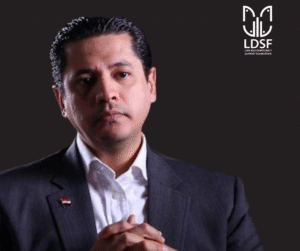
Law and Democracy Support Foundation (LDSF) strongly condemns the Egyptian authorities’ continued and escalating hostility towards freedom of expression online. In addition to its systematic policy of blocking news websites and digital media platforms, the government has been conducting ongoing security campaigns targeting content creators. The latest of these was a crackdown on TikTok, which resulted in the arrest of at least seven creators who were referred to the Public Prosecution on vague charges, such as “violating Egyptian family values.”
This campaign was launched following dozens of complaints filed by lawyers and private citizens as part of what has been called a “Campaign to Purify Society.” These complaints were submitted to the General Directorate for the Protection of Morality, the Cybercrime Unit, and the Office of the Public Prosecutor. Consequently, several prominent content creators were arrested, including “Suzy al-Urduniya, Umm Sajda, Umm Mekka, Shaker Mahzoor, Mohamed Khaled (aka Madahem), and Aliaa Qamroun.” They were charged with incitement to immorality, sharing “indecent” content, unlawful profiteering through online media, and—in some cases—possession of narcotics.
For years, the Public Prosecution has disregarded repeated calls by civil society to curb the abuse of the legal system through Hisbah (quasi-religious or moral complaints), which are enabled and instrumentalized by the state to legitimize its severe restrictions on public freedoms and garner public support. More recently, the Public Prosecution has shifted from passive bystander to active promoter, as seen in its May 2025 campaign calling on citizens to report content that allegedly violates “public morals,” even assigning dedicated phone lines for such complaints. This move has widened the circle of actors empowered to police free expression and jail creators and dissidents.
By condoning or weaponizing hisbah cases, the Egyptian authorities have transformed them into a sword hanging over the necks of opinion-holders, content creators, and artists—turning the law into a tool of intimidation and censorship. Even more concerning, this climate has encouraged attention-seekers to make a profession out of filing morality-based complaints, dedicating themselves to monitoring online content and reporting it en masse under the guise of protecting public ethics. These self-appointed moral guardians claim the right to define what is appropriate for society instead of simply refraining from consuming content they personally find objectionable.
Parallel to the security campaign, a member of parliament has submitted an official request to the House of Representatives to ban TikTok in Egypt. Meanwhile, the head of the Parliamentary Committee on Communications and Information Technology declared that TikTok has a final deadline of 65 days to comply with Egyptian law, threatening strict measures for non-compliance. These developments reflect a deep desire among various state institutions to fully control and suppress all forms of digital expression.
The Foundation stresses that this is part of a long-running pattern, wherein state bodies—especially the Public Prosecution and the Ministry of Interior—are used to criminalize digital expression. This is being carried out through the overbroad application of Article 25 of Law No. 175/2018 on Cybercrime, which penalizes any content that diverges from state-imposed norms of appearance, behavior, and expression. The article lacks precise legal drafting and violates the principle of legality—nullum crimen, nulla poena sine lege certa (no crime or punishment without clear legal provision).
Article 65 of the Egyptian Constitution explicitly guarantees “freedom of thought and opinion,” affirming every individual’s right to express themselves “verbally, in writing, through imagery, or by any other means.” This aligns with Article 19 of the International Covenant on Civil and Political Rights (ICCPR), ratified by Egypt in 1982, which protects the right to freedom of expression “regardless of frontiers and through any media,” including digital platforms.
The Foundation views the current campaign not only as a direct assault on fundamental freedoms, but also as a systematic effort to re-engineer society based on a singular vision of identity and morality—one that excludes any form of expression falling outside that mold, even if it is individual, digital, or aesthetic. This contravenes Egypt’s international obligations to uphold freedom of expression, cultural diversity, and personal appearance, as enshrined in UN treaties and the interpretive reports of the UN Special Rapporteurs on Freedom of Opinion and Expression.
Law and Democracy Support Foundation asserts that freedom of expression—including digital expression—is a non-negotiable right, protected by the Egyptian Constitution and binding international treaties. The use of law as a tool to coerce individuals into conforming to vague, unaccountable moral standards constitutes a grave threat to the rule of law, justice, and human dignity.
Accordingly, the Foundation calls for: An end to the use of hisbah-based legal actions in all their forms. The immediate and unconditional release of all individuals detained for exercising their legitimate right to digital expression. A halt to the misuse of Article 25 of the Cybercrime Law to criminalize speech and creativity. A guarantee that no individual will be prosecuted based on ambiguous charges such as “family values,” in line with the principle of legal certainty. An independent investigation into procedural violations against detained individuals, and a guarantee of fair trial standards. A review of state relations with digital platform companies, ensuring that these platforms are not used to expand censorship or restrict the right to expression






